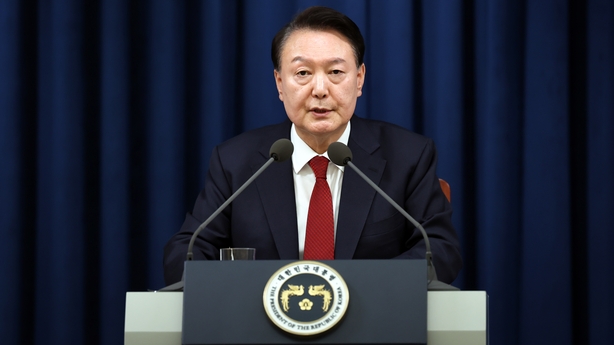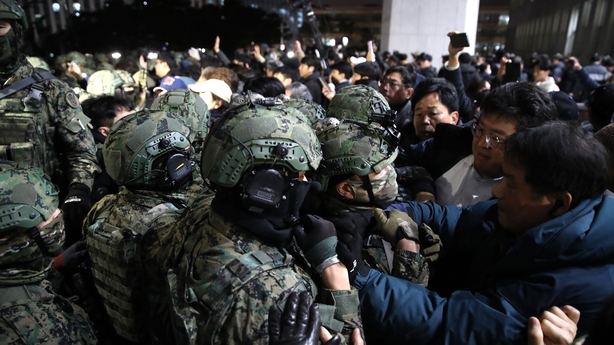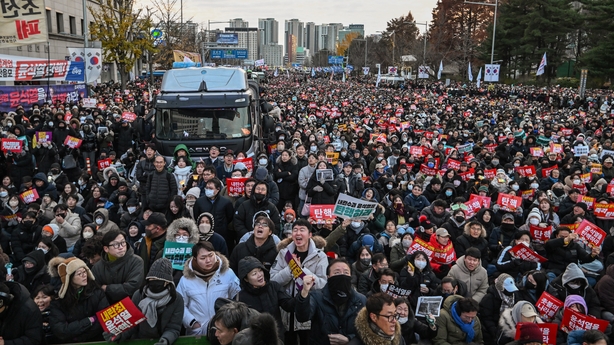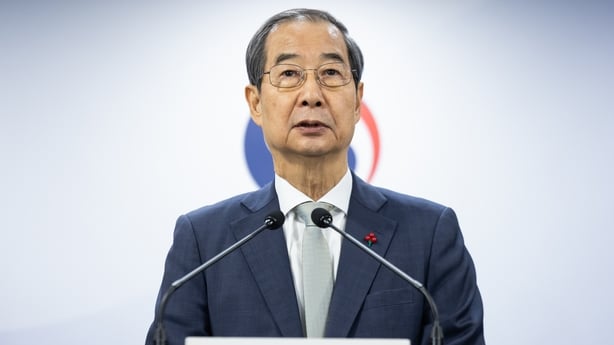South Korea has endured a month of political turmoil since President Yoon Suk Yeol declared martial law and sent soldiers and helicopters to parliament.
Forced to rescind the decree, Mr Yoon has since been impeached - pending a court ruling - and authorities this week issued a warrant for his arrest that expires on Monday.
Here is a recap of events:
3 December: Martial law
On 3 December 2024 after a budget tussle with the opposition, Mr Yoon takes to television to declare martial law in a flashback to Korea's authoritarian past.

He wants to protect the country against "threats posed by North Korea's communist forces and to eliminate anti-state elements plundering people's freedom and happiness".
Armed troops head to parliament, scaling fences, smashing windows and landing by helicopter in an apparent bid to stop politicians overturning the decree.

As thousands of protesters gather outside, politicians vote 190-0 to nullify Mr Yoon's declaration in the early hours of 4 December.
Soldiers begin withdrawing and Mr Yoon reappears on television and lifts martial law.
Protesters celebrate. Mr Yoon goes to ground.
4 December: Impeachment plan
The opposition immediately vows on 4 December to push for impeachment and file an official motion.
They file separate complaints of "insurrection" against Mr Yoon, his defence and interior ministers, and "key military and police figures involved, such as the martial law commander and the police chief".
Police announce they are investigating Mr Yoon and others for "insurrection".
7 December: Yoon apologises
Mr Yoon reappears on 7 December and apologises in a televised address for the "anxiety and inconvenience".
Tens of thousands of anti-Yoon protesters rally outside parliament.

An impeachment motion is defeated several hours later and Mr Yoon stays in power.
9 December: Yoon travel ban
On 8 December, Kim Yong-hyun, who had resigned as defence minister days earlier, is arrested over his role in the martial law declaration.
The interior minister resigns.
The main opposition party says it will try to impeach the president again on 14 December.
The next day the justice ministry announces it has banned Mr Yoon from travelling abroad.
On 12 December, Mr Yoon again defends his shock decision, saying the opposition pushed South Korea into a "national crisis".
14 December: Yoon impeached
Out of 300 politicians, 204 vote to impeach Mr Yoon and 85 vote against the motion.
Mr Yoon is suspended from office while South Korea's Constitutional Court has six months to deliberate on the vote.
Prime Minister Han Duck-soo becomes the nation's acting leader.

The vote is followed by scenes of jubilation among tens of thousands of demonstrators in front of the parliament building.
27 December: Second impeachment
The Corruption Investigation Office sends a third summons to Mr Yoon on 26 December, after he defied investigators' demands twice in a week.
Mr Yoon faces impeachment and criminal charges of insurrection, which could result in life imprisonment or even the death penalty.
On 27 December, MPs impeach acting president Mr Duck-soo over what the opposition calls his refusal to sign into law special bills to investigate Mr Yoon.
Finance minister Choi Sang-mok takes over.
30 December: Arrest warrant
Investigators apply for an arrest warrant for Mr Yoon after he failed to report for questioning a third time.
This is the first attempt in the country's history to forcibly detain a president before an impeachment procedure is complete.
A court issues the warrant, valid until 6 January. Mr Yoon's lawyer calls it "illegal and invalid".
1 January: Yoon defiant
Investigators vow to execute the warrant before the deadline, saying coordination with police is under way to prepare for Mr Yoon's arrest.
Hundreds of his supporters gather outside his compound in protest against his impeachment.
Mr Yoon repeats in a statement a pledge to fight alongside them "until the very end to protect this nation".
3 January: Arrest attempt
Investigators attempt to arrest Mr Yoon at his residence, but abandon their attempt after a standoff with his security team.
A Corruption Investigation Office official said that around 20 investigators and 80 police officers were heavily outnumbered by about 200 soldiers and security personnel linking arms to block their way after entering the presidential compound.
Negotiations between the two sides failed and the investigators decided to leave for their safety, although another arrest attempt could take place after a review, the official added.
The deadline for the execution of the warrant is Monday.

